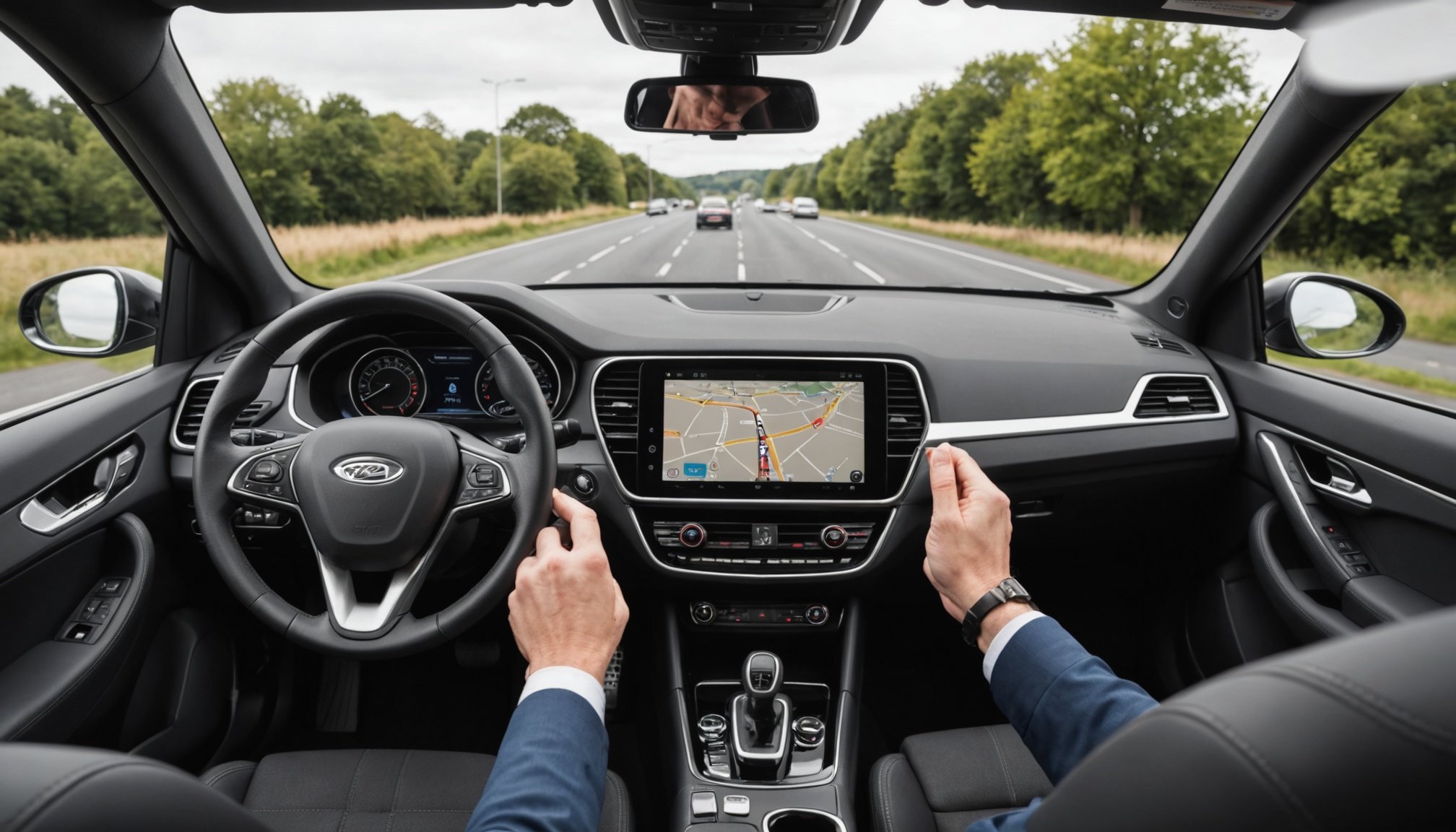Overview of Technology in UK Driving
In the modern UK driving landscape, diverse driving technology optimizes safety and efficiency. The development of automotive innovations has reshaped driver expectations and experiences, making smart driving solutions increasingly vital. These advancements address key driver needs, ranging from safety enhancements to efficiency improvements, ensuring a smoother driving experience.
Presently, the UK’s automotive industry is spearheading technological advancements that affect millions of drivers. Innovations in driver assistance technologies have reduced road accidents while enhancing driver confidence significantly. Lane-keeping assist systems, adaptive cruise control, and automatic emergency braking are shining examples of how integral technology has become to automotive safety.
This might interest you : Essential insights for uk first-time car owners: responsibilities you need to know
Moreover, for UK drivers, the integration of these technologies isn’t just about embracing new tools; it’s about improving the fundamental driving experience. Smart driving solutions, such as advanced navigation systems and digital dashboards, ensure informed and efficient routes. This revolution isn’t limited to passenger comfort but extends to vehicle performance, heralding a new era of eco-driving and connectivity. In summary, the ongoing evolution and widespread incorporation of these technologies highlight their critical role in transforming the UK driving scene. As these innovations continue to advance, UK drivers can anticipate a safer, more efficient, and environmentally responsible driving experience.
Navigation Systems and Apps
In the modern driving landscape, navigation technology plays a pivotal role in easing the journey for UK motorists. Enhanced GPS systems and intuitive driving apps lead this tech revolution, offering drivers crucial real-time information. Real-time traffic updates and rerouting capabilities ensure that individuals avoid delays, optimising their travel and time efficiency.
In parallel : Discover the future: emerging car technologies set to transform the uk market
Leading Navigation Apps for UK Drivers
UK drivers have several reliable navigation apps at their disposal. Popular choices such as Google Maps, Waze, and TomTom consistently receive high marks for their features and performance. These apps excel in providing detailed maps, accurate GPS tracking, and implementing crowd-sourced data. This array of features helps predict traffic patterns and suggest alternative routes, keeping journeys as seamless as possible.
Advanced GPS Features
Today’s advanced GPS systems go beyond mere directions. Users benefit from functionalities like lane guidance and speed limit alerts, which bolster driving confidence. Voice command features allow hands-free operation, improving road safety and keeping drivers focused. Enhanced POI (Points of Interest) identification ensures easy navigation to services or attractions.
User Experience and Interface Comparisons
User-friendly interfaces significantly impact how enjoyable and effective a navigation app is. Clear visuals, straightforward menus, and customisable maps contribute to an improved user experience, ensuring quick adaptation for new users. Integration with smart driving solutions further enhances these technologies, promising a bright, efficient future for UK drivers.
Smart Connectivity and In-Car Technology
In the realm of connected cars, in-car tech offers drivers a seamless, enriched experience. The integration of smart driving features is not just about luxury but about elevating everyday convenience for UK motorists.
Infotainment Systems
Modern infotainment systems have grown beyond simple entertainment devices. They serve as comprehensive hubs for vehicle information, easy access to navigation and safety features, and even diagnostics. Smartphone connectivity enables drivers to manage calls, messages, and media without distraction, streamlining the driving experience.
Integration of Smartphone Connectivity and Apps
The integration of smartphone connectivity ensures that drivers stay connected on the move. With apps like Android Auto and Apple CarPlay, important functions such as calls, navigation, and media can be accessed with a simple interface. These systems often include voice commands, offering a hands-free experience that enhances safety by letting drivers keep their focus on the road.
Future Trends
Looking ahead, developments in car-to-device links are set to revolutionise how in-car technology functions. With advancements in 5G networks and real-time data sharing, the interaction between vehicles and external devices promises to be more intuitive and efficient. Skilled smart driving features will soon be an indispensable staple for UK drivers.
Vehicle Safety Features
In the realm of modern driving technology, robust automotive safety technology has markedly improved the safety and confidence of UK drivers. Driver assistance systems now offer crucial support features like lane-keeping assist, adaptive cruise control, and automatic emergency braking, all pivotal in reducing road accidents.
Lane-keeping assist systems are designed to prevent unintended lane departures by warning or gently steering the vehicle back on track. Similarly, adaptive cruise control dynamically adjusts the vehicle’s speed based on the traffic flow, maintaining a safe distance from the car ahead. It proves invaluable on busy motorways, ensuring a more relaxed drive.
Automatic emergency braking is one of the other critical vehicle features, predicting potential collisions and applying brakes automatically. This tech has saved countless accidents, making it essential in the UK’s safety arsenal.
Real-world scenarios underline the efficacy of these technologies. For example, the Department for Transport in the UK reported a significant decrease in collision rates in vehicles equipped with these modern safety features. As the automotive industry continues to innovate, UK drivers can look forward to enhanced safety measures, further boosting their road safety and driving experience.
Enhancing Driving Efficiency
In the pursuit of driving efficiency, the UK automotive industry is significantly embracing fuel efficiency technology. Smart Fuel Management Systems are at the forefront, optimising fuel consumption through precise data analysis. These systems adjust engine performance based on driving conditions, ensuring minimal fuel waste. By monitoring speed, RPM, and gear shifts, drivers can achieve optimal fuel usage, contributing to lower emissions and cost savings.
Eco-driving apps and features are equally instrumental, providing drivers with insights on how to adapt their driving styles for better efficiency. These apps offer real-time feedback and personalised tips, helping users achieve more miles per gallon. Implementing suggestions from these applications has been shown to result in noticeably improved fuel economy, making them a valuable tool for environmentally-conscious drivers.
The rise of electric vehicles (EVs) is reshaping the future landscape of driving. Offering zero emissions and reduced running costs, EVs present a sustainable alternative to traditional vehicles. The UK’s infrastructure for EVs is rapidly developing, with increasing numbers of charging stations and incentives for EV buyers. This surge in electric mobility not only promotes eco-friendly driving but also supports governmental goals for carbon reduction, significantly impacting how transportation will evolve in the coming years.
Upcoming Trends in Automotive Technology
The horizon of automotive technology trends is brimming with innovations poised to transform driving. Among the forefront, autonomous driving developments are pioneering this change. Such technology allows vehicles to operate with minimal human intervention, promising enhanced safety and convenience. Manufacturers and tech companies invest heavily in AI systems capable of navigating complex driving environments, although widespread adoption faces regulatory and ethical hurdles.
Vehicle-to-Everything (V2X) Communication
V2X communication technology is another promising advancement that significantly enhances road safety and traffic management. This technology enables vehicles to communicate with each other and surrounding infrastructure, offering real-time alerts on obstacles, traffic conditions, and potential hazards. The successful integration of V2X is expected to reduce accidents and improve urban traffic flow, making journeys more predictable and efficient.
Innovations in Electric and Hybrid Vehicles
The rise of electric and hybrid vehicle technologies is redefining sustainable transportation. With government incentives and a growing charging infrastructure, these vehicles are gaining popularity for their environmental benefits. Innovations in battery technology and energy efficiency are crucial as they extend driving range and reduce charging time, making electric vehicles a viable alternative to traditional combustion engines. As these trends continue to evolve, they represent a significant leap towards smarter and more sustainable driving solutions.
Practical Tips for UK Drivers
Incorporating technology into your daily routine can significantly enhance your driving experience. Smart driving practices ensure that you utilise these advancements effectively.
Embrace routine updates for apps and vehicle software as they often contain crucial safety improvements and new features. Keeping your systems updated ensures reliability and access to the latest tech innovations. Many manufacturers provide automatic updates, making the process seamless, but regularly checking for updates can prevent overlooking any essential improvements.
Safety is paramount when integrating technology on the road. Ensure that technology usage complements rather than distracts from driving. Use features such as voice commands for navigation apps and infotainment systems to maintain focus. When possible, configure apps and settings before your journey begins, reducing the need for interaction while driving.
Lastly, consider the ecological impact of your driving habits. Utilising eco-driving solutions such as efficient route planning and speed optimisation can contribute to a more sustainable environment. Adjusting your driving style in accordance with insights provided by eco-driving apps help reduce fuel consumption and emissions.
By adhering to these tips, UK drivers can leverage technology to enhance both the safety and efficiency of their travels.





